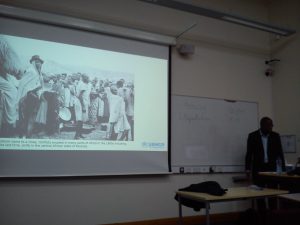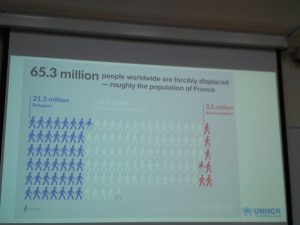On Tuesday 18 October, CeCIL’s exploration of vulnerability and resistance in contemporary international law was greatly enriched by an engaging and insightful talk by Alan Deve on the ongoing refugee crisis. Drawing upon extensive experience in practice, including his current work as a legal officer for the United Nations High Commission on Refugees (‘UNHCR’), Alan offered a valuable perspective on the difficult question of whether the current international legal regime governing refugees is suitable for contemporary circumstances? After all given that the 1951 Refugee Convention was created specifically to deal with the situation of post-Second World War Europe (and only made universally applicable through the 1967 Protocol) how can it account for the very different world we inhabit today? Yet for Alan, assertions of the current system’s inadequacy, despite their intuitive appeal, must nonetheless be subject to critical scrutiny.
the current international legal regime governing refugees is suitable for contemporary circumstances? After all given that the 1951 Refugee Convention was created specifically to deal with the situation of post-Second World War Europe (and only made universally applicable through the 1967 Protocol) how can it account for the very different world we inhabit today? Yet for Alan, assertions of the current system’s inadequacy, despite their intuitive appeal, must nonetheless be subject to critical scrutiny.
After clarifying legal status definitions (‘refugee,’ ‘asylum seeker,’ ‘internally displaced person,’ ‘migrant,’ etc.) and providing a historical overview of UNHCR’s development, Alan highlighted some of the common criticisms of the current legal regime. These criticisms include an overly narrow definition of a ‘refugee,’ that lack of assistance to asylum seeker prior to reaching a signatory state, the possibly of the system creating channels for human trafficking, and the lack of consideration for the social and economic burdens placed on refugee receiving countries. For Alan these criticisms fail to provide a compelling case for a radically revising the existing legal order. After all, the strict criteria for refugee status is being subject to nuanced development through litigation in national court systems, protection prior to border crossing is already covered by the internally displaced persons regime, human trafficking activities are furthered by the absence not the presence of channels for asylum seekers, and the burdens on individual states is a question of international solidarity that exists beyond specific legal provisions.
 For Alan, the issues raised by these criticisms are very real, but, they demand political will as opposed to simply churning out more legal mechanisms at the international level. The challenges to generating this political will are severe and necessitate the confrontation of disturbing trends including the externalisation/militarisation of borders, the securitisation of immigrant detention, and the proliferation of regulations that force everyday citizens to function as de facto immigration officers. Moreover, all of these trends point to Western states failing to do their fair share in supporting the international refugee regime. This means that the burdens often fall on the typically poor states bordering situations of humanitarian crisis who nonetheless make far more efficient use of resources than in the West. By bringing these questions of political will to the forefront in analysing the law of the international refugee system and its discontents, Alan’s talk certainly exemplified CeCIL’s mission of understanding international law as inseparable from the particular social contexts it inhabits.
For Alan, the issues raised by these criticisms are very real, but, they demand political will as opposed to simply churning out more legal mechanisms at the international level. The challenges to generating this political will are severe and necessitate the confrontation of disturbing trends including the externalisation/militarisation of borders, the securitisation of immigrant detention, and the proliferation of regulations that force everyday citizens to function as de facto immigration officers. Moreover, all of these trends point to Western states failing to do their fair share in supporting the international refugee regime. This means that the burdens often fall on the typically poor states bordering situations of humanitarian crisis who nonetheless make far more efficient use of resources than in the West. By bringing these questions of political will to the forefront in analysing the law of the international refugee system and its discontents, Alan’s talk certainly exemplified CeCIL’s mission of understanding international law as inseparable from the particular social contexts it inhabits.
